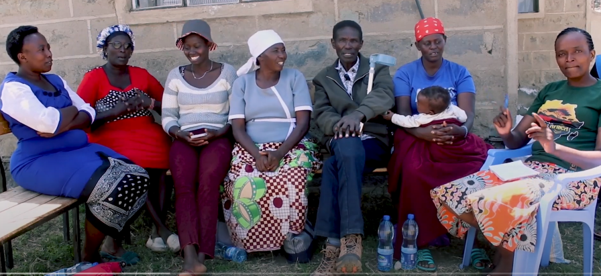In 2024, former PM+ clients from the informal settlements Karagita and Rhonda in Nakuru County, Kenya, who had completed six sessions of the PM+ strategies, joined support groups for continued psychosocial support, independent of MIDRIFT.
In Karagita, seven group members continue to meet and offer each other psychosocial and moral support as well as engage in soap making as an income-generating activity. In Rhonda, 20 group members initiated a table banking initiative, where each member saves money monthly and then the group lends to members.
CONTEXT:
Nakuru County has a total population of 2,162,202 people as per the 2019 census report. The county has eleven sub-counties, and Karagita (Naivasha Sub-County) and Rhonda (Nakuru West Sub-County) are among the major informal settlements that are affected by social, environmental, and health issues such as rapid population growth, lack of adequate social amenities, inadequate infrastructure, poverty, unemployment, criminal activities, insecurity, and violence, including gender-based violence.
A field study titled, Gender Based Violence in Two Informal Settlements in Nakuru County, Kenya (2020) found that 61.5% (N=301) of women interviewed reported violence from their husbands or partners. This significantly affected their mental or physical health and their ability to work. Further, a MIDRIFT-DIGNITY 2023 study on Root Causes of GBV in the Informal Settlements of Nakuru County, revealed that physical violence was the most common form of violence at 79.3% (N=411) as mentioned by the respondents, followed by emotional violence at 42.3% and sexual violence at 48.2%.
Survivors of GBV and other forms of violence had difficulties in trusting others, especially when they were harmed by people they trusted, or when there was no one in their circles with whom they were able to build a trustworthy relationship.
In response, MIDRIFT, through the Mental Health and Psychosocial Support (MHPSS) project, initiated support groups in the two informal settlements for PM+ beneficiaries to continue practicing PM+ strategies and peer-to-peer support to address issues that were common among them. The support groups offered safe spaces for self-expression, and members received direct psychological support. Furthermore, the support group members started socioeconomic initiatives for self-development and their well-being.
CONTRIBUTION
Since 2018, MIDRIFT has capacity-built 42 community health promoters (CHP) on the PM+ approach to become PM+ Helpers and seven Community Health Extension Workers (CHEWS) as PM+ supervisors. The helpers guide clients on psychological coping strategies such as Managing Stress, Problem Management, Get Going and Keep Going, and Strengthening Social Support. These strategies are implemented within six sessions.
PM+ helpers have a strong support system from their immediate PM+ supervisors and MIDRIFT psychologists. They hold weekly meetings to debrief and are further guided on strategies they find difficult to explain to the client. MIDRIFT also facilitates team-building and self-care sessions for helpers and their supervisors to reconnect.
For PM+ beneficiaries who are willing to join support groups, MIDRIFT facilitates the first ten sessions of the support group meetings; after which the groups are left to run independently and start their initiatives for sustainability. The support group members still have access to a PM+ Helper in case they need further support.
MIDRIFT collaborates well with the County Department of Health Services, working closely with the county focal persons for mental health and community services to enhance service delivery by the CHPs and CHEWs. Support groups are significant platforms for PM+ beneficiaries to practice the PM+ strategies and experience peer-to-peer support. This strengthens their resilience to everyday life challenges, and they become ambassadors of PM+ in the community.
CHPs are useful resource persons in the community. They are part of the County Department of Health Services, thereby anchoring PM+ within this health structure, which enhances access to community-based mental health and psycho-social support for communities in the informal settlements. This creates sustainability and possibilities for scale-up.



